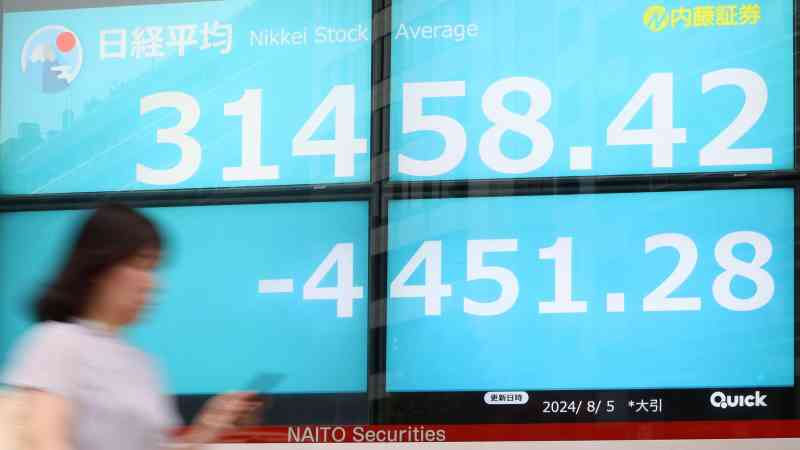A global market rout intensified on Monday as stock markets in London, Tokyo and New York fell over mounting fears that the United States could be heading for a recession. By 5pm in London the FTSE 100 was at 2 per cent, or 166.48 points, with the more UK-focused FTSE 250 down 2.7 per cent per cent, at 20,267 mid-afternoon.
The heavy falls wiped billions off the value of pensions and Isas. In New York, the technology-heavy Nasdaq fell even further having dropped last Friday more than 10 per cent from its most recent record close of 18,647.45 on July 10.
The index was 576.08 points by closing, or 3.4 per cent, lower at 16,200.08 while the more broadly based S&P 500 was just holding above correction territory.
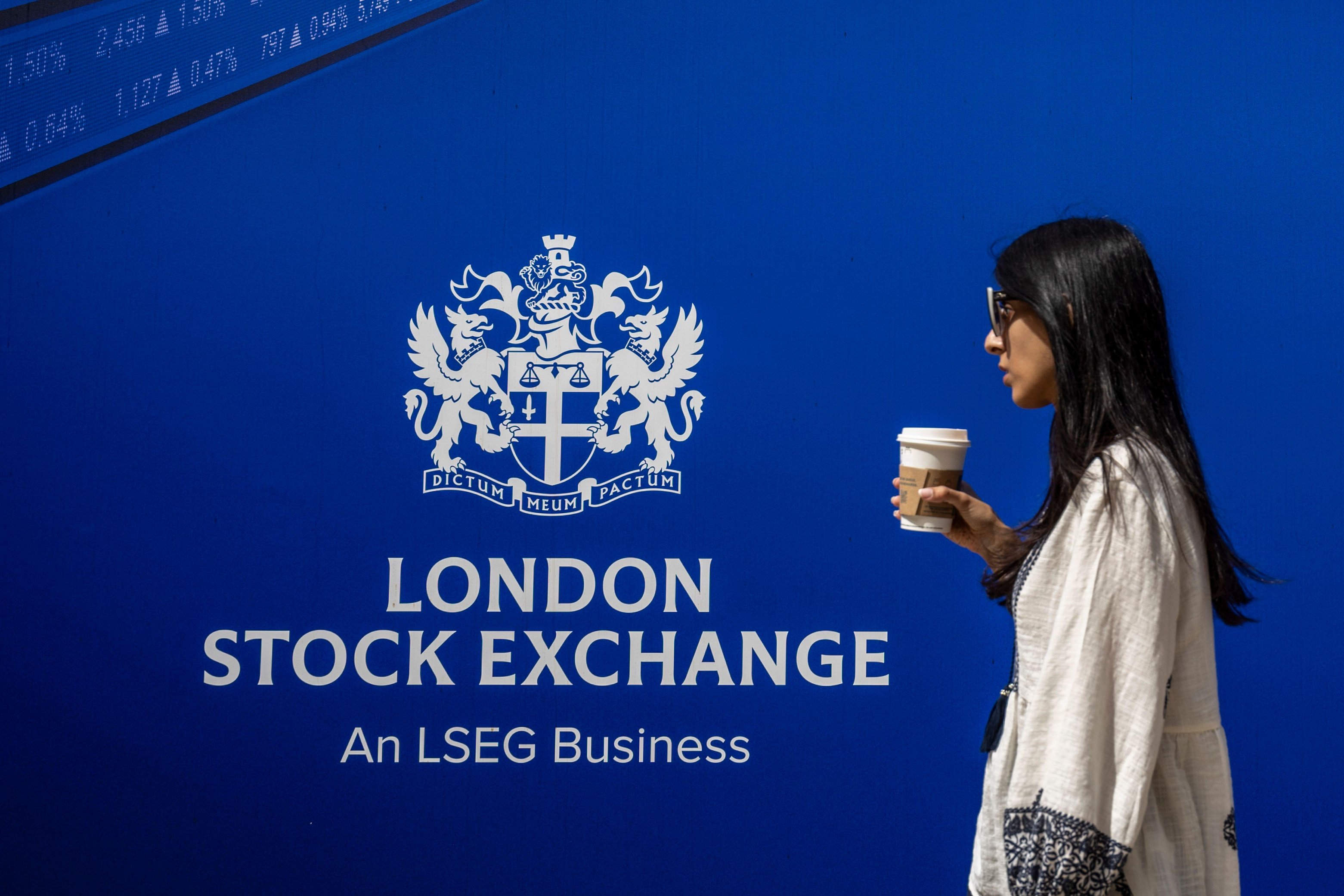
The standings of the Magnificent Seven
A select group of technology stocks — dubbed the Magnificent Seven — now account for more than a third of the S&P 500 by value. Here’s how they fared in Monday’s selloff:
• Google owner, Alphabet, down 4.6 per cent at $160.64• Amazon, down 4.1 per cent at $161.02• Apple down 4.8 per cent at $209.27• Meta Platforms, Facebook owner, down 2.5 per cent at $475.73• Microsoft, down 3.3 per cent at $395.15• Nvidia, the chip marker, down 6.4 per cent at $100.45• Tesla down 4.2 per cent at $198.88
Closing time in New York
Despite some positive data from the services sector indicating the world’s largest economy was not about to tip into recession, technology stocks led a sell-off with banks also out of favour.
By the close of trading the Dow Jones industrial average had dropped 1,033.99 points, or 2.6 per cent to 38,703.27, its worst day since September 13 2022. The S&P 500 also had its biggest one day fall since mid-September two years ago after shedding 160.23 points, or 3 per cent, to 5.186.33.
The Nasdaq is now firmly in correction territory having fallen 13 per cent since its record close on July 10.
Hedge funds blamed for chaos
A global scramble by opportunistic hedge funds to exit a well-trodden cheap borrowing gambit has been blamed for the share sell-off that shook financial markets on Monday.
Japan suffered a fully fledged flight from shares with stock prices falling by 12 per cent and the jitters reverberated round the world, with share prices in London and then Wall Street falling sharply amid a stampede to reduce risk in portfolios and raise hard cash.
Several trillion dollars were wiped from the value of share prices worldwide while the uncertainty also engulfed the crypto world, with the price of bitcoin tumbling by as much as 15 per cent at one point. It later rallied and was last trading at $54,102.
• Read more: The chaos that wiped trillions off shares
Will the Magnificent Seven ride again?
With high-growth expectations baked into their valuations, technology stocks have always been susceptible to big swings (Emma Powell writes).
Turbocharged by indications of a strengthening American economy, the prospect of interest rate cuts and artificial intelligence hype, a select group of stocks — the so-called Magnificent Seven — now account for more than a third of the S&P 500 by value, and have generated the bulk of the blue-chip index’s gains.
The Mag-Seven — Alphabet, Apple, Amazon, Meta Platforms, Netflix, Nvidia and Tesla — that have powered most of this year’s stock market gains have had a rough few weeks, shedding more than $2.3 trillion since a July peak.
• Read more: Weak economic data and mixed earnings have spooked investors
Shares worth $500m sold by Nvidia boss
Jensen Huang, Nvidia’s founder and boss, sold almost $500 million worth of shares in June and July, ahead of a sharp sell-off in tech stocks.
Huang, 61, made a series of stock sales as the frenzy around artificial intelligence stocks mounted, before investors became increasingly worried that valuations were becoming overstretched. The shares sales included $322.7 million of shares in July, according to Bloomberg analysis.
The June and July sales were executed under a trading plan agreed in March. Nvidia stock currently 7.5 per cent lower company into the close on Wall Street.
What is the ‘yen carry trade’?
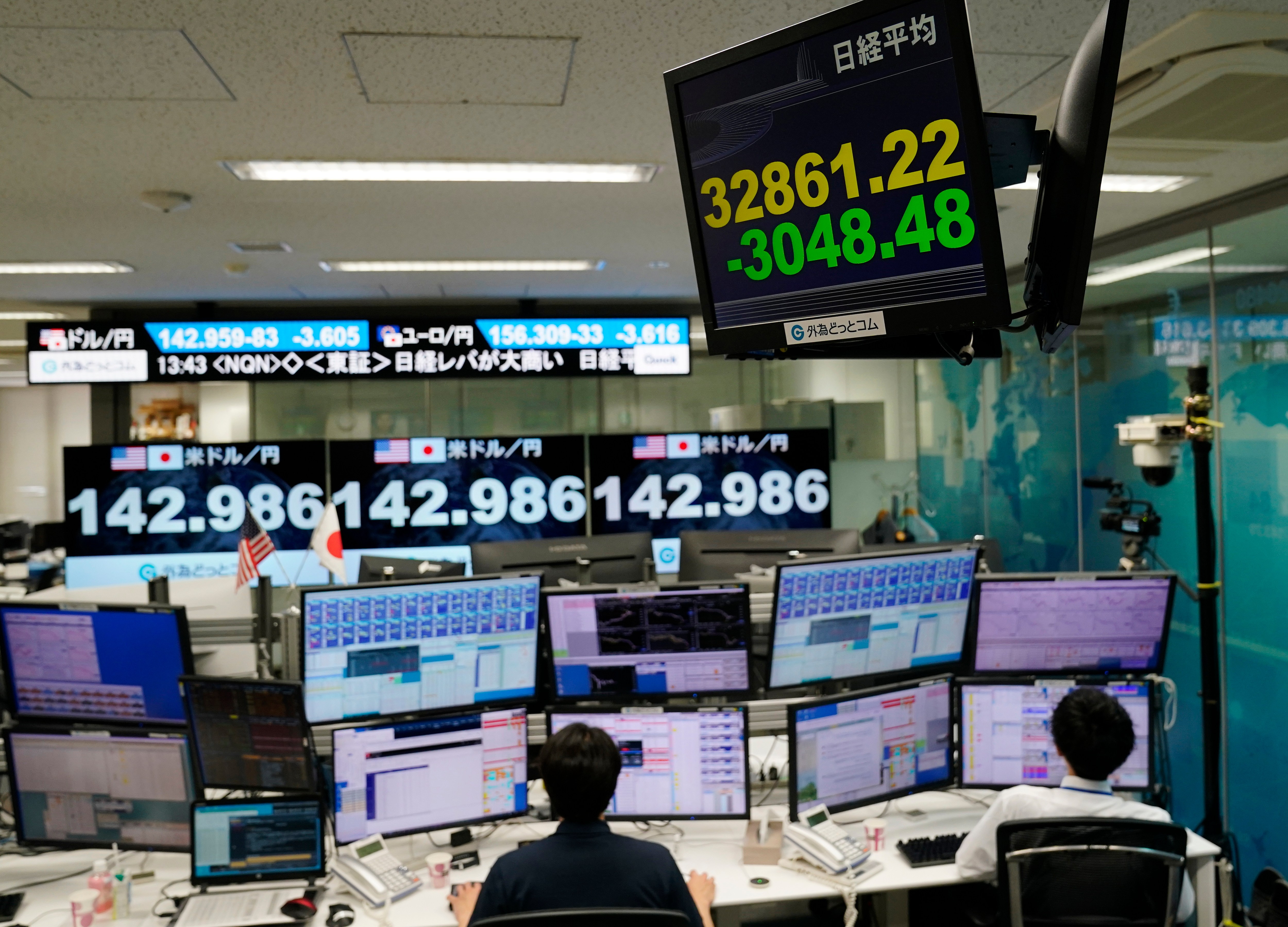
Adding to the pressures has been the so-called yen carry trade (Patrick Hosking writes). This is the highly popular form of arbitrage by which investors borrow in yen on cheap terms and use the proceeds to buy overseas assets including bonds and shares. The surge in the yen has forced investors to reverse these trades after incurring heavy foreign exchange losses. This has also pushed up the yen. Investors have also had to sell local assets to cover these losses.
The shift has been seismic. According to Russ Mould, investment director at A J Bell: “The Japanese currency has been a major source of global liquidity, as major market players have shorted it, borrowed against it and used that money to go for long-risk assets around the globe.” Now, “massive short positions” were being closed out, driving the yen still higher, and “creating a circle every bit as vicious as it had previously been virtuous”.
Kyle Rodda, a senior financial market analyst at Capital.com, said: “We are basically seeing a mass deleveraging as investors sell assets to fund their losses.”
‘Yen carry trade’ sparked the panic
Analysts said that while weak US job numbers last week and scepticism about the valuations of the biggest US technology giants might explain some of the equity market sell-off, it was the wrongfooting of investors using a technique known as the “yen carry trade” which had sparked and then amplified the panic.
“You can’t unwind the biggest carry trade the world has ever seen without breaking a few heads,” Kit Juckes, chief currency strategist at Societe Generale, said.
Hedge funds have routinely borrowed in yen and then bought higher-yielding Japanese and non-Japanese assets to make easy profits, but were caught out by a surge of 12 per cent in the yen in less than a month, which in effect has made it more expensive to pay back the debt.
In pictures: London, Japan and New York
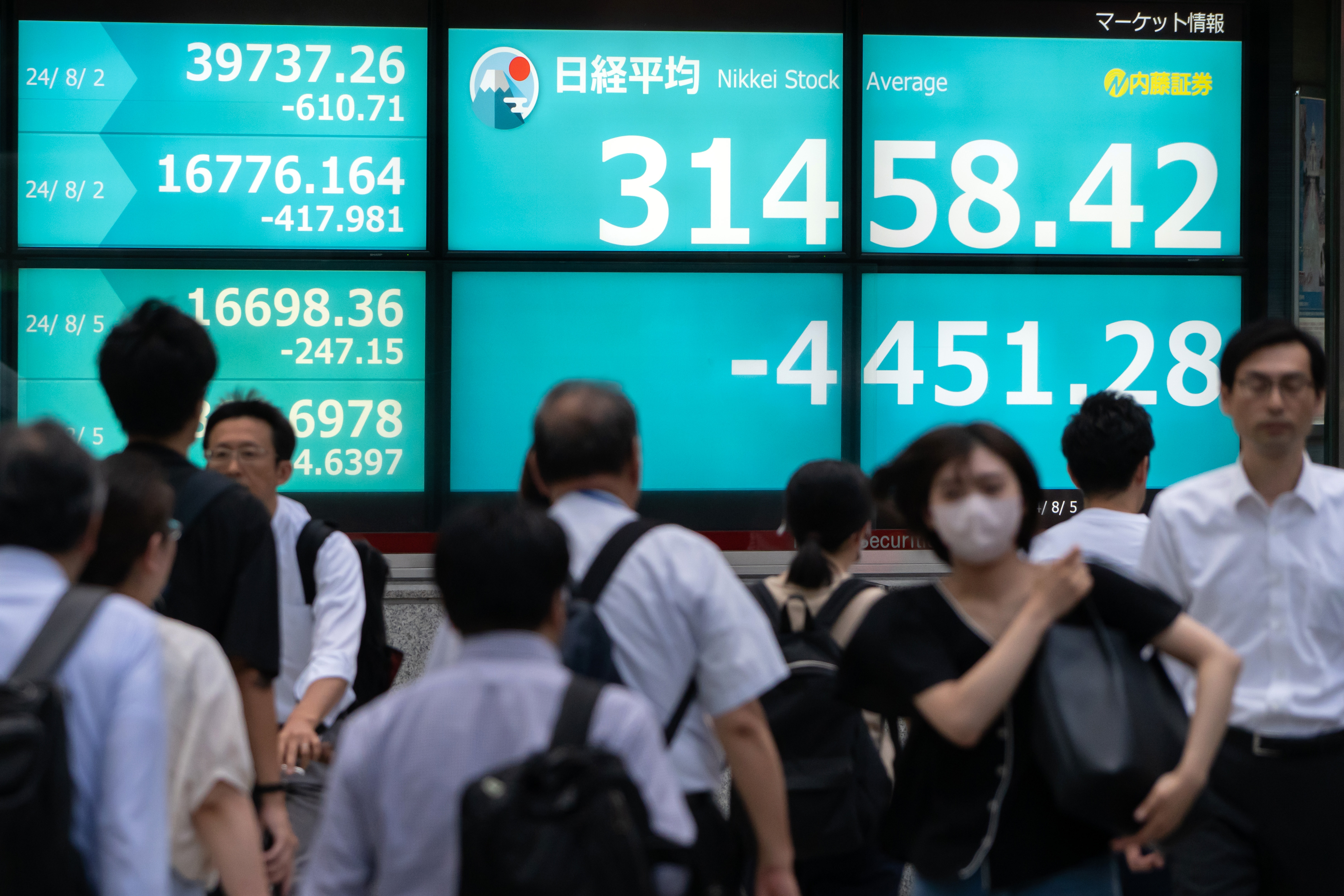
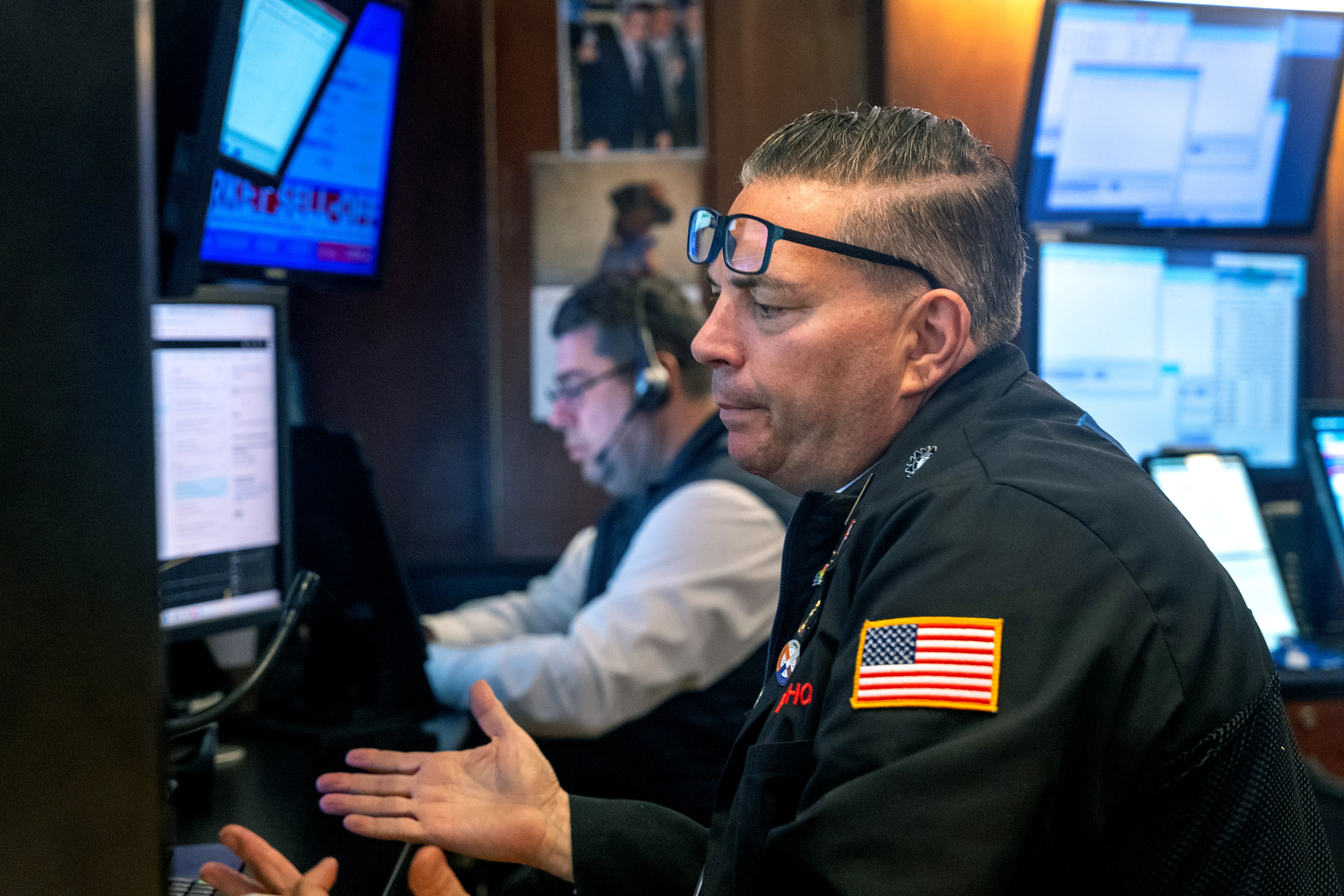
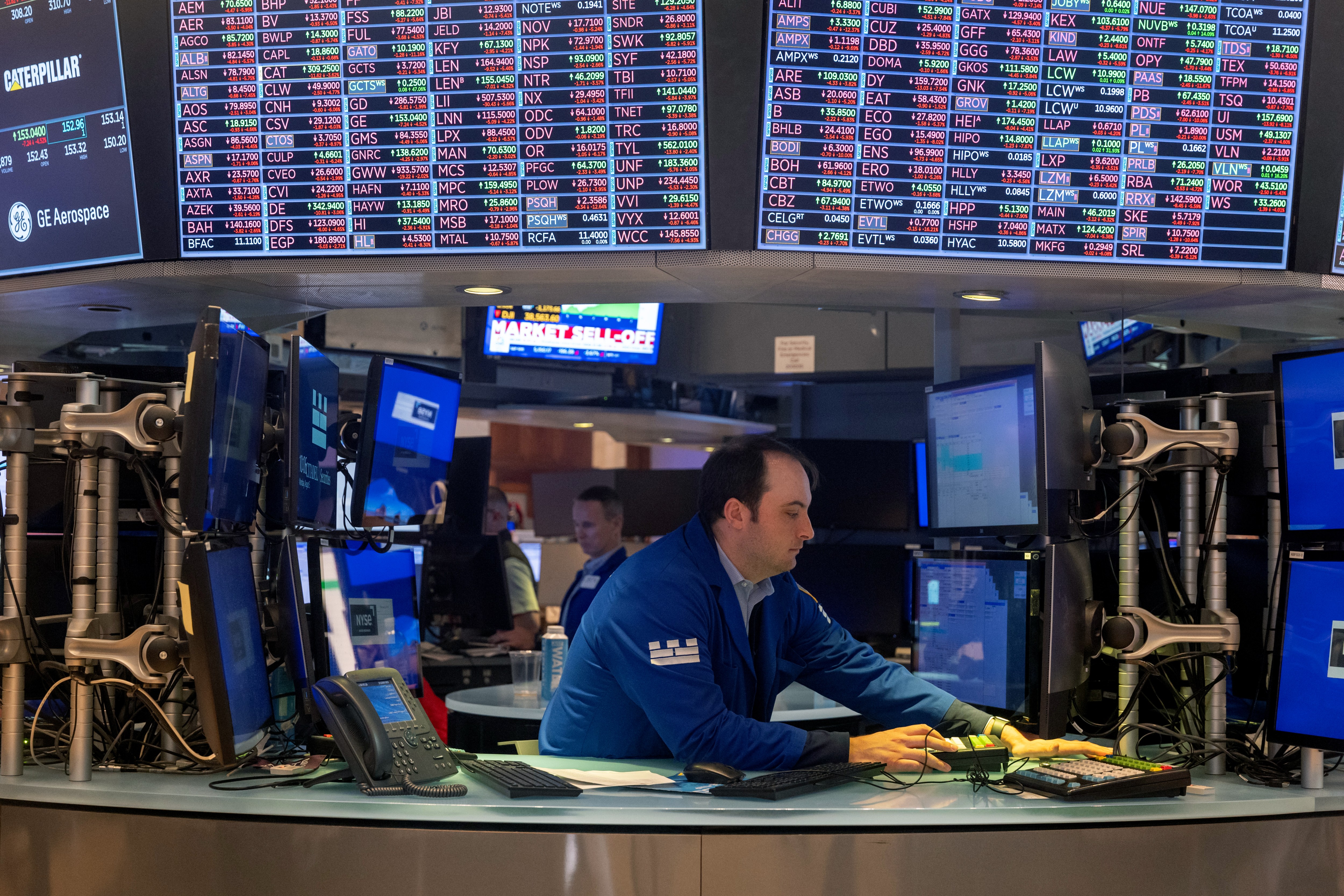
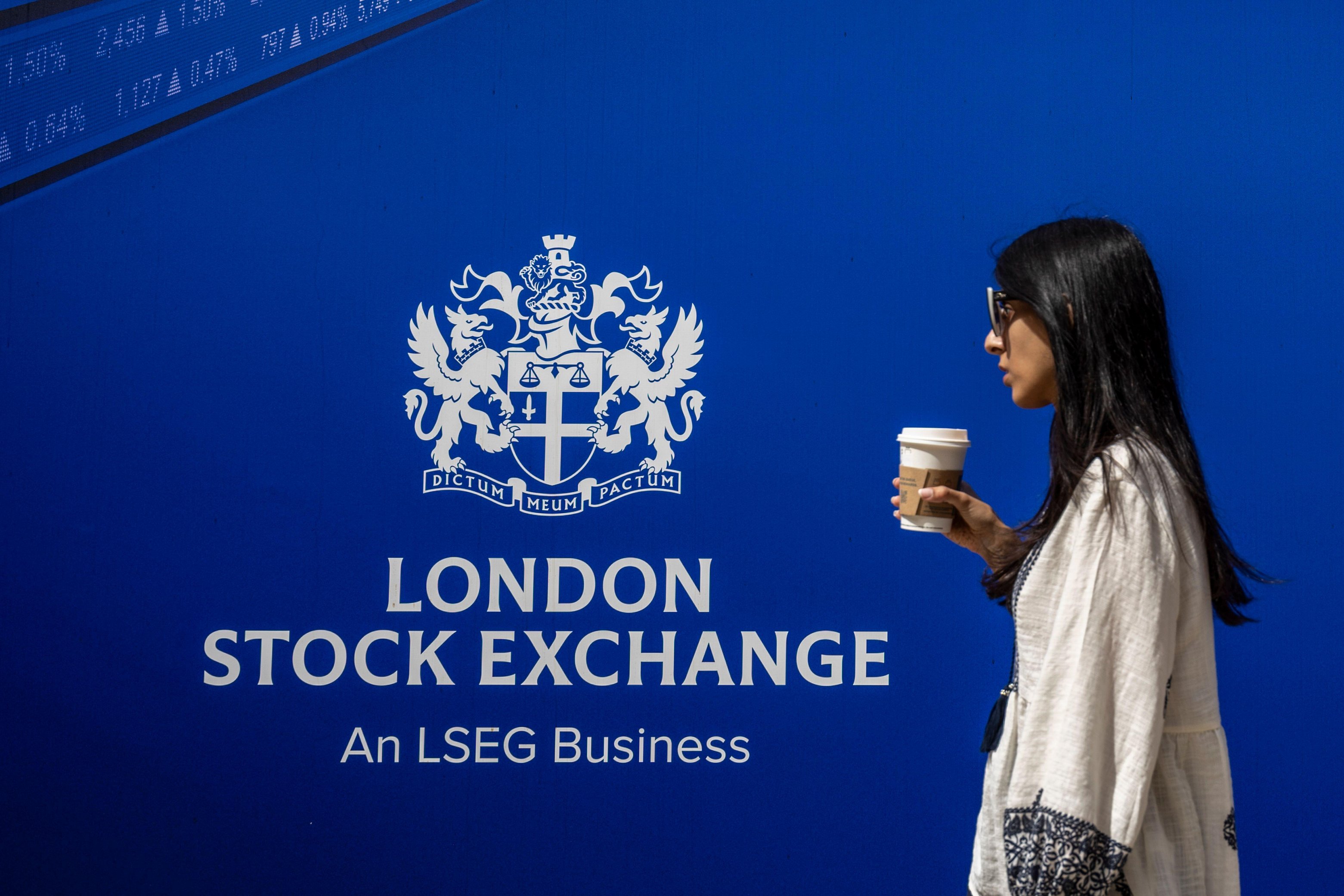
US recession risk has risen, says Goldman Sachs
The risk of the United States sliding into recession has risen, one of the world’s most powerful investment banks has said amid mounting investor fears about the health of the world’s largest economy (Ben Martin writes).
Analysts at Goldman Sachs told clients that they had increased the probability of a US recession to 25 per cent from 15 per cent following the release of American labour market data last Friday that showed the unemployment rate had risen to 4.3 per cent last month, the highest level since October 2021.
The disappointing jobs figures have fuelled investor concerns that the US Federal Reserve erred with its decision last week to leave interest rates unchanged at a 23-year high. This in turn has encouraged a rout in global stock markets, which intensified on Monday as equities around the world tumbled.
• Read more: US recession risk has risen, says Goldman Sachs
Bitcoin price also falls in market turbulence
The global turbulence has hit the cryptocurrency market, with the price of bitcoin falling 5.56 per cent over 24 hours to £42,891.11. The world’s biggest cryptocurrency has now fallen 17 per cent in a week.
However, it is still up 88 per cent year on year. Ethereum, another leading cryptocurrency, is down 9 per cent in 24 hours according to Coinbase.
Traders are now debating whether Bitcoin prices below $53,000 represent a golden opportunity to buy or if the risk of another drop is too high.
Why are Japanese stocks being hit hardest?
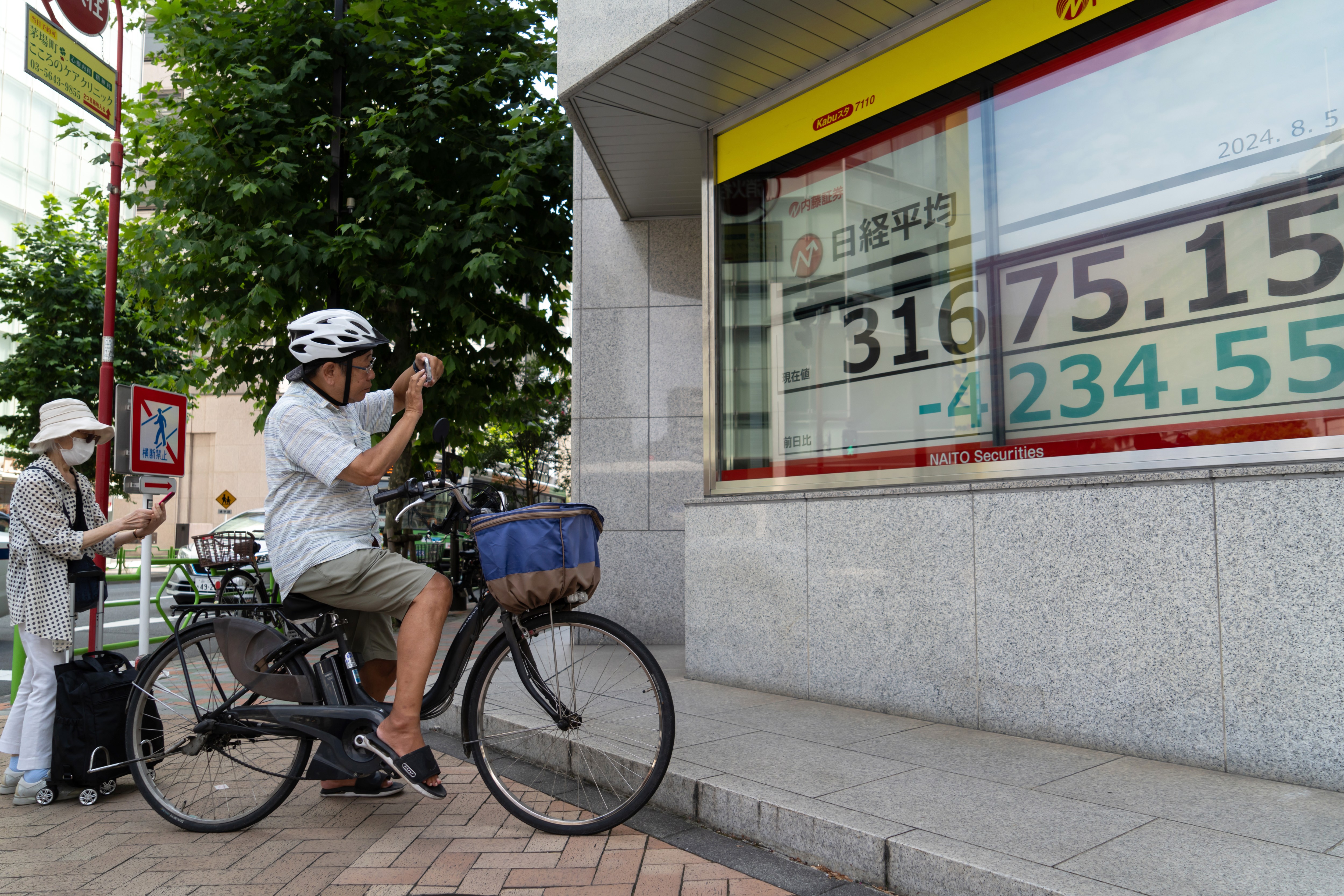
Japan’s equities have erased all of their gains for the year following Monday’s plunge — stung by a rapid rise in the yen after the Bank of Japan last week hoisted its main interest rate to 0.25 per cent, the highest level since the global financial crisis in late 2008.
The more hawkish stance in Japan has contrasted with expectations for a dovish shift in US monetary policy.
This has caused an unwinding of so-called “carry trades” in which investors borrow in a country with low rates to invest in one with high rates.
This interplay has sent the yen rallying more than 11 per cent against the US dollar — a seismic move in currency markets — since the end of June to ¥143.95. However, a stronger currency is a big headwind for the country’s exporter-heavy stock benchmarks.
Buffett sells another $50bn of Apple shares
Warren Buffett has dumped another $50 billion-worth of shares in Apple, halving Berkshire Hathaway’s holding in the iPhone maker since the start of the year.
Apple remains Berkshire Hathaway’s largest investment by far, with five companies — American Express, Bank of America, the Coca-Cola Company and Chevron Corporation, alongside Apple —accounting for 72 per cent of the value of the portfolio.
The disclosure comes amid a broader sell-off in technology stocks, as a mixed set of corporate earnings and weak jobs data prompted concerns of a slowdown in the American economy.
• Read more: Buffett sells more Apple shares
‘Soft landing most likely outcome’
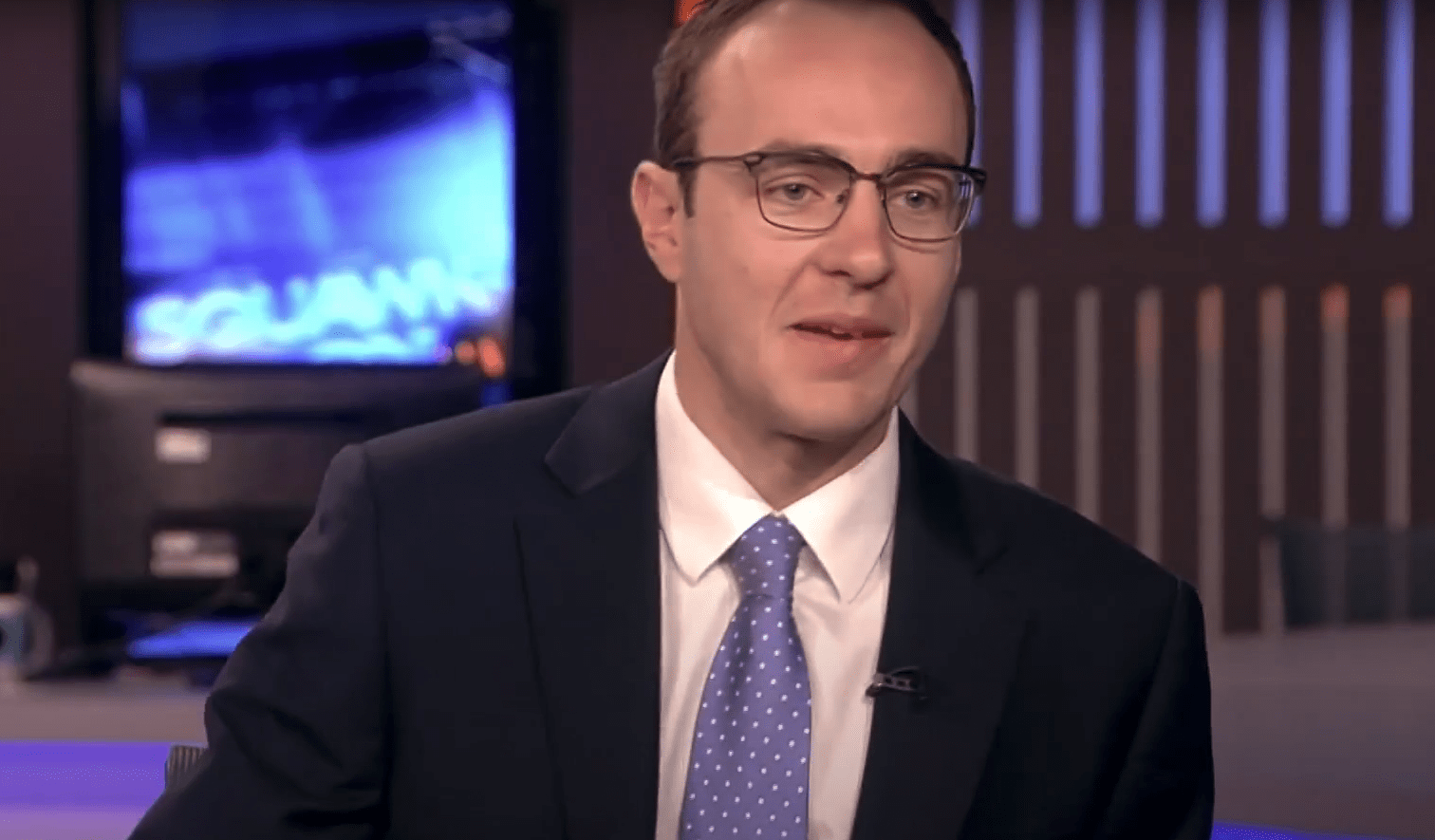
Stephen Brown, deputy chief North America economist at the consultancy Capital Economics, said of the Wall Street sell-off: “Despite the weakness of the latest labour market data, we judge that a soft landing is still the most likely outcome for the economy.
“Nonetheless, the risk of a hard landing has increased, while the disorderly market reaction — if sustained — could prompt the Fed to loosen policy faster than we forecast.”
Emergency rate cut ‘not needed’
An emergency rate cut is not needed, and the Fed needs room to manoeuvre according to Close Brothers Asset Management.
Isabel Albarran, investment officer at the asset manager, said: “The volatility roiling markets has stoked concerns that the Fed has left it too late, and recession could be looming. While the Fed must maintain the market’s confidence, we think an emergency rate cut would be a bit extreme in response to relatively limited softer data.
“Friday’s labour market print was indeed soft, especially on the private payrolls side, but it was still in positive territory and, while ISM manufacturing readings have fallen sharply in June and July, today’s services ISM data revived just as dramatically to 51.4 in July, and should calm fears of an aggressive downturn.
“A more attractive alternative [to an emergency cut] could be to use “Fed speak” to signal commitment to a September cut. A 50 basis point cut could hit this home and is rapidly being priced in by markets, but this will depend on softer data continuing over the coming month.”
Pace of sell-off easing in New York
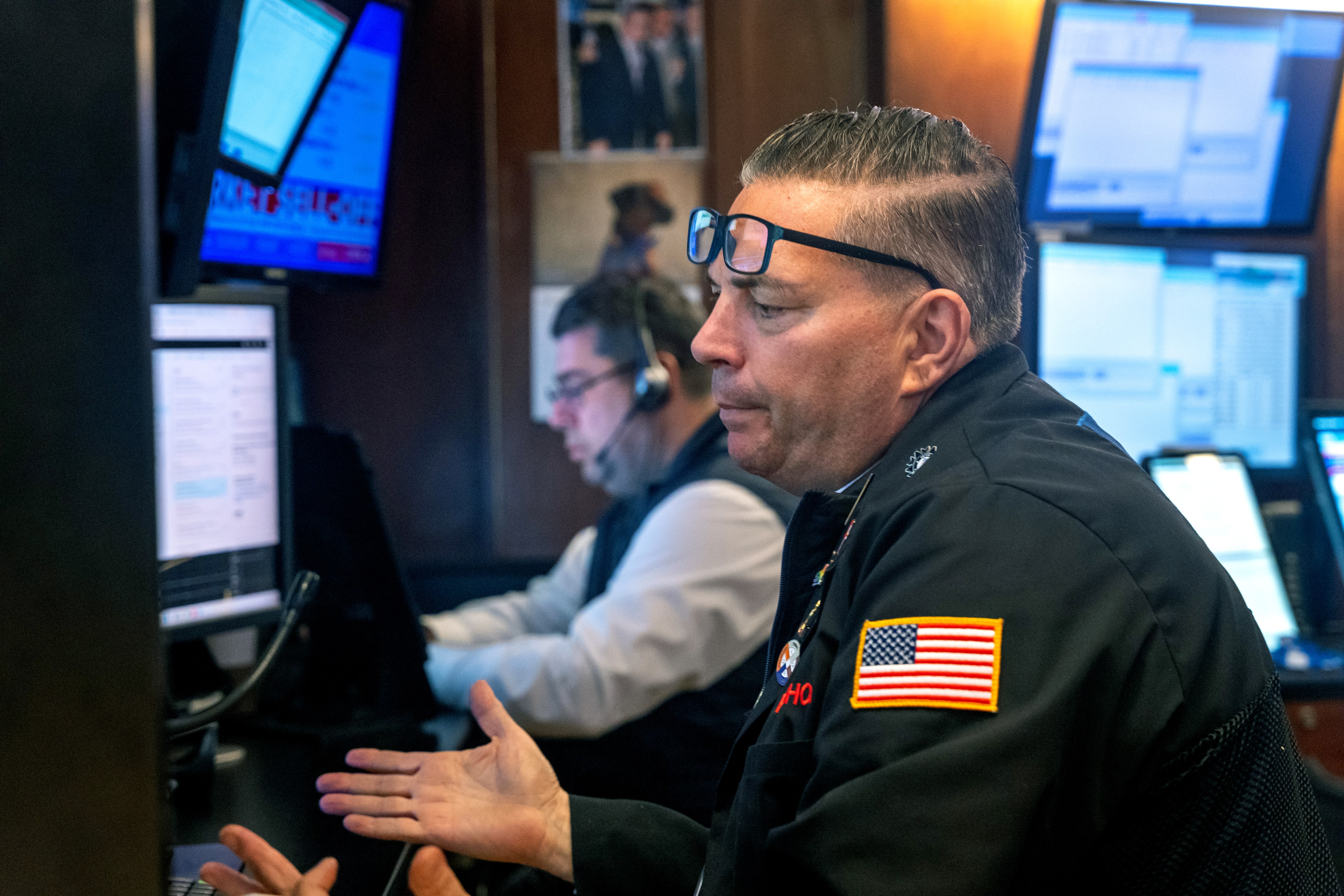
By lunchtime on Wall Street the pace of the sell-off had eased after encouraging US services data raised hopes that the world’s biggest economy was not about to fall into recession.
The technology-heavy Nasdaq, which fell by 6.3 per cent at the start of trading in New York, had pared losses and by lunchtime was down 2.5 per cent at 16,362.97, still firmly in official correction territory having fallen more than 10 per cent from its record high 18,647.45 on July 10.
The more broadly-based S&P 500 was 2.1 per cent lower.
FTSE 100 closes after huge single-day fall
The FTSE 100 fell by 166.48 points, or 2 per cent, to 8,008.23, its largest single-day fall in slightly more than a year.
Scottish Mortgage Investment Trust, exposed to the US tech sell-off, was among the biggest fallers on the day — dropping by 45¼p, or 5.6 per cent, to 768p.
A fall of 69p, or 35 per cent, to 128p for John Wood Group after Sidara said it was pulling out of the bidding for the energy services company pushed the FTSE 250 well into the red.
The index, owing also to its relatively higher exposure to Asia-focused and tech-focused trusts, dropped by considerably more than the FTSE 100, ending down by 589.61 points, or 2.8 per cent, to 20,236.74.
SoftBank shares slump wipes out £12bn
More than £12 billion was erased from the value of SoftBank in one day after the Japanese technology conglomerate found itself in the eye of the storm over financial markets (Ben Martin writes).
Shares in the company dropped by almost 19 per cent on Monday in the heaviest one-day fall by the stock since the business, which owns the British microchip designer Arm, listed in Tokyo 26 years ago.
It takes the slump suffered by SoftBank shares since the beginning of last week to 30 per cent, making it one of the biggest casualties of the global rout. It also deals a big blow to the fortune of Masayoshi Son, SoftBank’s billionaire founder and chief executive who owns about 30 per cent of the group’s shares.
• Read more: Japanese technology conglomerate suffers heaviest one-day fall
US-listed bank shares drop
Shares in the biggest US-listed banks dropped sharply as fears of a recessions sent investors fleeing from a sector closely tied to the health of the economy.
Citigroup’s share fell by 5.6 per cent, Goldman Sachs and Morgan Stanley retreated 4.5 per cent and 4.2 per cent, respectively, while Wells Fargo and Bank of America were down about 4 per cent and JP Morgan’s shares were trading 2.5 per cent lower.
Investors have been increasingly jittery since a crisis of confidence hit the sector last year, in part due to higher interest rates, and took down three major regional players.
Vix soars above 42 in sign of panic
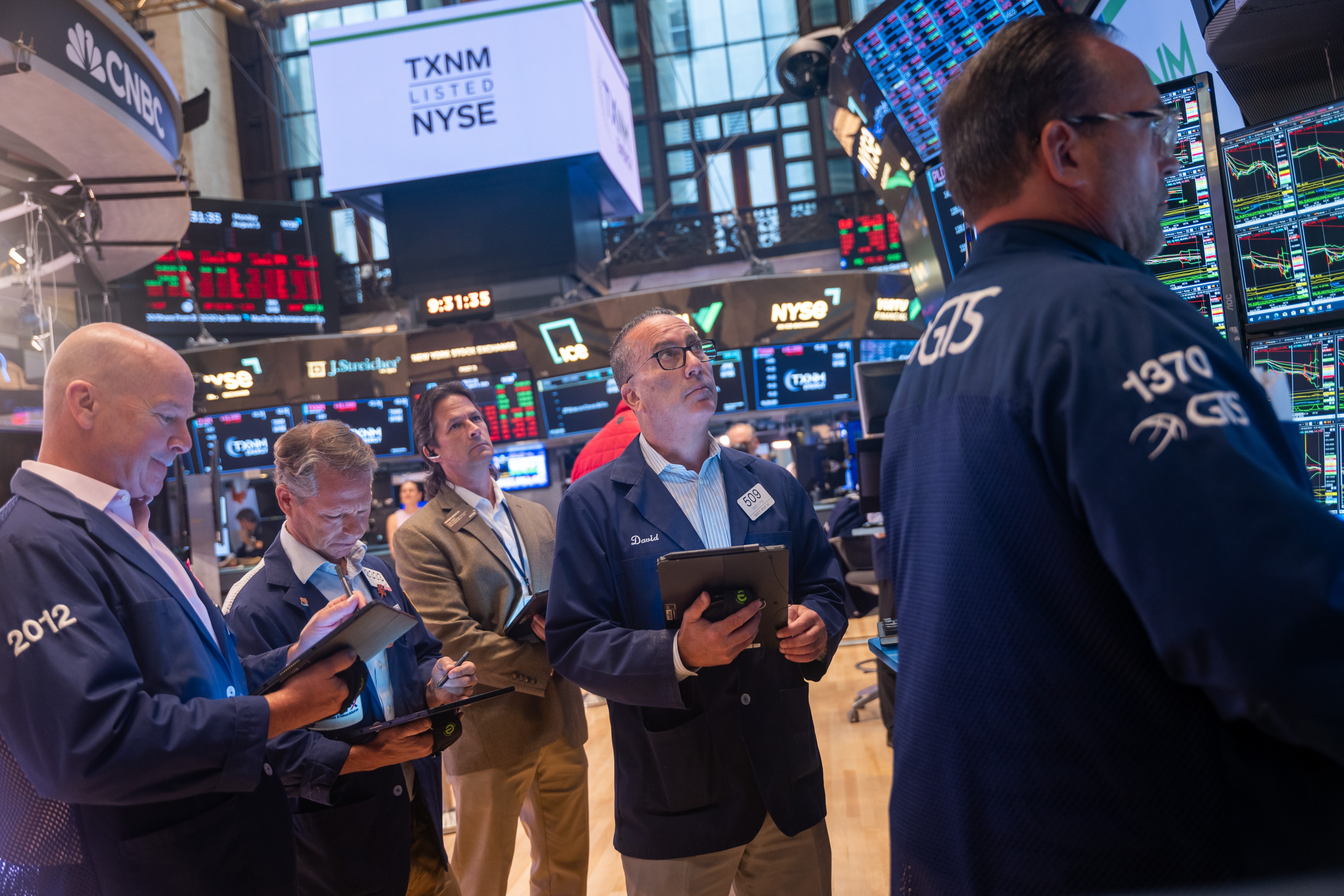
In a sign of the panic on Wall Street and in the City of London today, the Vix, better known as the “markets’ fear gauge”, has popped to its highest level since the early days of the pandemic.
The index, which is designed to calculate the expected volatility of the US stock market, is up above 42, the highest it has been since April 2020, shortly after the world went into the first lockdowns.
For context, until today the Vix had not been above 20 so far in 2024. It is higher now than it was when the Russia-Ukraine war broke out two and a half years ago, although it remains some way shy of its pandemic peak of 82.
Apple shares at lowest level in a month
Shares in Apple were trading at their lowest level in more than a month after falling 4.6 per cent as the market reacted to news of Warren Buffet dumping another $50 billion-worth of shares in the iPhone maker, halving Berkshire Hathaway’s holding in the company since the start of the year.
Berkshire Hathaway, the New York-listed conglomerate led by the “Sage of Omaha”, sold 390 million shares in the technology company during the second quarter, leaving it with 400 million shares worth about $84.2 billion.
Buffet, who started building a stake in the company in 2016, began accelerating its selling in May after dumping 115 million shares during the first three months of the year.
Central bank could make larger rate cuts
Investors are piling into bets that the US Federal Reserve will respond to signs of weakness in the economy with more aggressive interest rate cuts. Futures prices now imply the central bank will cut rates to a range of 4 per cent to 4.25 per cent by year-end, according to CME Group data. That would require 1.25 percentage points in cuts over its meetings in September, November and December.
A larger September rate cut is now expected by the vast majority of investors. Futures imply a 94.5 per cent chance of a half-percentage point cut at that meeting, up from 74 per cent on Friday and just 11 per cent a week ago, according to CME Group. A week ago, investors had expected just 0.75 percentage point of cuts this year, or three quarter-point reductions.
Overnight tumble single biggest Nikkei points fall
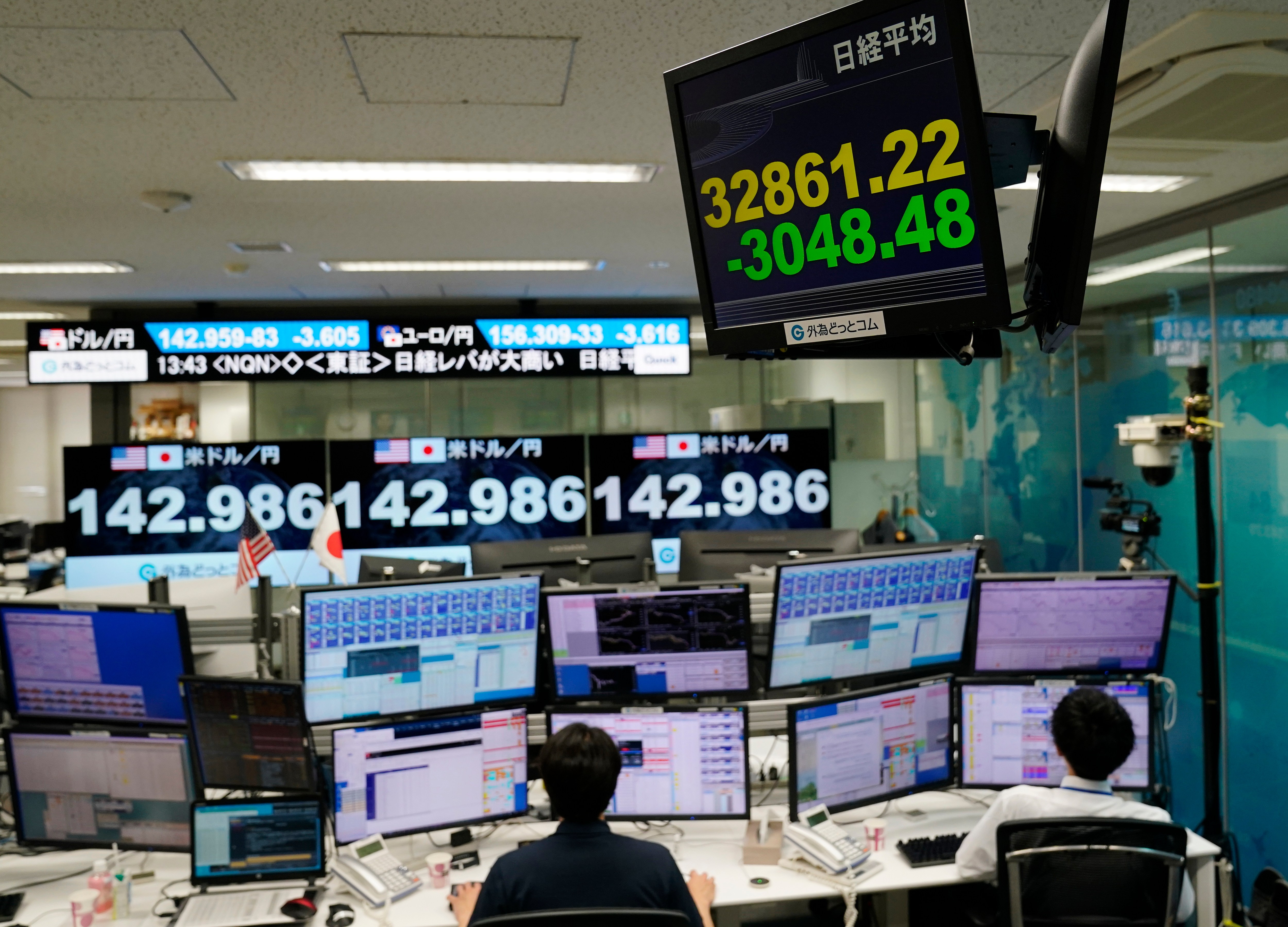
Heavy falls in Tokyo overnight had triggered the global sell-off. The 4,451-point, 12.4 per cent tumble in the Nikkei to 31,458 was the single biggest points fall in the Nikkei ever and the largest in percentage terms since 1987.
Some of Japan’s most recognisable companies were caught up in the sell-off, with the carmakers Toyota Motor and Honda diving by 14 per cent and 18 per cent respectively, and the electronics giant Sony down by 8 per cent.
Another big faller was SoftBank, best known in the UK for its part-ownership of the Cambridge-based chip design group Arm Holdings, which fell by 19 per cent. Fast Retailing, which owns the Uniqlo chain, was down by almost 10 per cent.
Trouble accessing share-trading accounts
Thousands of investors have been unable to log into their share-trading accounts in early trading in the US, with the websites of some of the biggest American brokerages struggling to cope amid the market sell-off.
Customers of Charles Schwab, Fidelity, Vanguard and TD Ameritrade, among others, have reported troubles accessing their accounts, according to Downdetector.com.
Charles Schwab blamed a “technical issue” for why some of its customers cannot log on and cautioned that “hold times may be longer than usual” for anyone wanting to speak to one of its customer care team. Fidelity said that it was “working urgently” to resolve the issues.
Investors already on the hunt for bargains
Some investors are already looking for bargains in Tokyo. Joe Bauernfreund, who manages the £1 billion AVI Global Trust, a FTSE 250 member, said that some of the share price changes today were “devoid of fundamentals” down to panic.
One of his investments, Nihon Kohden, a Japanese maker of defibrillators and ventilators, had the dubious distinction of being the worst performer in the Topix index, down by 24 per cent today.
The trust’s shares fell 4.8 per cent today, while the sister trust AVI Japan Opportunities, which Bauernfreund also manages, was down 6.75 per cent.
However, Bauernfreund was sanguine: “We will be adding to some of these beaten up names over the next few days,” he said. There were opportunities to be had from “sifting through the rubble,” he said.
Analysis: What does the turbulence in Japan mean for global markets?
Only two months ago the outlook for Japanese shares had rarely looked sunnier (Patrick Hosking writes). There was “a compelling case for long-term investments into Japanese equities”, declared June Aitken, chair of London-listed CC Japan Income and Growth Trust, one of the easiest ways for UK investors to buy into the Tokyo market.
Improving economic conditions, positive governance reforms, a much greater emphasis on capital efficiency and a relatively weak yen should all support valuations, she said. The country’s expertise in robotics, AI and other corners of technology were a bonus.
She wasn’t alone. Mainstream investment opinion was that after many false dawns, the Japanese market was at last hauling itself out of a decades-long slump. Until last month Japan had become one of the best-performing major markets in the world, with the Nikkei 225 index surging by about 50 per cent in the previous two years.
• Read more: The slump in the Nikkei 225 index has dashed any complacency about the world’s third-largest economy
FTSE 100 at 2.1 pr cent in final hour
As the FTSE 100 entered its final hour of trading, the premier index was trading 2.1 per cent at 8,001.04, looking on track to settle at its lowest level since mid-April. The the more UK-focused FTSE 250 slipped 2.7 per cent, to 20,275.
Scottish Mortgage Investment Trust, which invests in many of the technology companies listed in New York, was the biggest faller in the blue-chip index, down 7.5 per cent. Bill Ackman’s Peershing Square Holdings was down 4.5 per cent.
A weakness in gold prices caused miners who dig for the yellow metal to fall. They included Fresnillo and Endeavour Mining, which were down 5.6 per cent and 4.4 per cent, respectively.
‘Magnificent Seven’ losses to wipe $900bn
Among the biggest stock market fallers in the US included Intel, the chipmaker, which last week said that it was planning to cut 15,000 jobs in an attempt to revive its manufacturing operations, which dropped 7.1 per cent. Shares in Goldman Sachs, the Wall Street investment bank, lost 3.8 per cent.
The “Magnificent Seven” stocks of giant US technology companies were under pressure, with Apple and Amazon tumbling 4.2 per cent and 4 per cent, respectively. Microsoft fell 2.6 per cent.
The losses in the Magnificent Seven stocks were set to wipe out nearly $900 billion from the combined market value of the companies.
Warning to Goldman Sachs clients
Goldman Sachs, the US investment bank, warned in a note to clients over the weekend that the US Federal Reserve would have to cut interest rates sharply if incoming data reinforced concerns about the US economy.
The prediction fed into the global stock market sell-off on Monday, which has seen the main Japanese stock index — the Nikkei 225 — fall at the fastest daily pace since the 1980s. However, Goldman’s analysts said that they did not believe the latest weak labour market data signalled the start of a trend. Figures published last week by the US Bureau of Labor Statistics revealed that the US economy added 114,000 jobs in July, well below expectations, triggering sharp declines in stock markets around the world.
The Goldman analysts conceded, however, that, if they are wrong and the labour market has indeed taken a downturn, “then a 50 basis points cut would be likely in September” from the Fed.
Separate data released on Monday afternoon signalled that the US economy is in better shape than initially thought. The ISM services PMI climbed to 51.4 in July from 48.8 in the previous month. It also topped analysts’ expectations and the 50-point mark that separates growth from contraction. Employment in the services sector ramped up, the data showed.
Comment: Black Monday crash didn’t last long. We’ll bounce back again now
On Monday, Japan’s stock market suffered its biggest fall since Black Monday in 1987 (Gerard Lyons writes). There was contagion as stock markets across the globe crashed.
Last Wednesday, the US Federal Reserve left policy rates unchanged at 5.25 per cent to 5.5 per cent but stressed its bias to ease. By Friday the Fed’s lack of action was already being seen as a policy mistake, as data showed US jobs growth slowing and unemployment rising in July.
Although the Fed described the economy as solid and drew attention to strong private domestic demand, the rate of US unemployment is 0.9 per cent above the low seen in April 2023, often a harbinger of recession. Now the markets fear a hard landing and expect US rates to be cut by 1.25 points by December.
• Read more: The world economy has proved resilient to shocks
